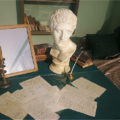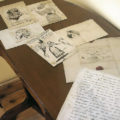Alexander Pushkin’s autumn in Boldino may provide a lesson on how to stay creative and active during a quarantine.
Our modern-day pandemic is sadly not the first in human history. Between 1830-1831, cholera raged across Russia and the world, causing many large cities to be placed under quarantine. However, humanity has this quarantine to thank for “The Belkin’s Tales”, “The Little Tragedies” and a number of other masterpieces by Pushkin.
1830 was an important year for the poet. On May 6th, Pushkin announced his engagement to Natalia Goncharova. The poet, deeply in love, wanted to marry as soon as possible, but circumstances constantly interfered with the preparations.
First, the bride’s mother considered it humiliating for her daughter to be married without a dowry. Then, Vasily Pushkin, the poet’s uncle, died in August of 1830. The mourning that followed the funeral provided another reason to postpone the wedding. Meanwhile, the cholera pandemic, which had started in Bengal in 1816, had reached Russia. The first case was registered in Astrakhan in 1823 and by 1829, some 3.5 thousand people in the country had fallen ill and 865 people had died.
In the summer of 1830, cholera reared its head again in the Russian Empire. The first infection was registered in Tiflis, present-day Tbilisi, then in Astrakhan. By September, this “dog’s death”, as cholera was described, had reached Moscow. Emperor Nicholas I arrived in the city to lead the fight against the pandemic, remaining there until October 7th, 1830. Alexander Pushkin wrote the poem “Hero” in honor of the sovereign’s immense courage.
In an effort to prevent the further spread of cholera, authorities placed Moscow under quarantine. Banks closed their doors and trade ceased. A special cholera committee was established and on September 23rd , “The Cholera Gazette” was published to inform the population about the progress made in the struggle against the disease. The city was completely closed to outsiders. Even nobility who had retreated to their estates for the summer were prohibited from returning to Moscow.
And what about Pushkin? He seemed to be completely absorbed in every detail of the upcoming marriage. His father Sergey Pushkin had granted him the estate of Kistenevo, not far from Boldino. The groom, burning with impatience, now had a plan: to take possession of the estate, mortgage it, and give the proceeds to his future mother-in-law as a dowry for his bride Natalia. This way the reputation of the bride would not be sullied in the eyes of the world. On August 31, 1830, Pushkin left Moscow for Boldino. Although he planned to finish his business in two weeks, he would end up stuck there for three months. However, his autumn in Boldino turned out to be one of the most creatively productive periods of Pushkin’s life.
“Today, in the unbearable hours of quarantine, with no books or comrades with me, I decided to pass the time,” the poet begins his pivotal notes from that period. Indeed, when Pushkin went to Boldino, he brought only three books: the second volume of History of the Russian People by Nikolay Polevoy, The Iliad, and the works of the English poet Barry Cornwall. But how these months in Boldino have enriched Russian literature with masterpieces!
“I will tell you a secret: not for a long time have I written as productively as I have in Boldino. Here is what I brought: the last two chapters of Onegin, the 8th and 9th chapters, completely ready for print; a story written in octaves, which we will publish anonymously; and several dramatic plays, or small tragedies, such as “The Miserly Knight”, “Mozart and Salieri”, “A Feast in Time of Plague”, and “Don Juan”. What is more, I have written around 30 small poems. Is that good? That’s not all: I have written five novellas in prose — Baratynsky laughed hysterically after reading them. We will publish the novellas anonymously”, the poet wrote in December 1830 to his friend Pyotr Pletnyov, a literary critic, professor of the Department of Russian Literature at St. Petersburg University and the literature teacher of the heir to the throne, Alexander II.
It was during the Boldino period that Pushkin became a true master of prose. In September, he finished his work on “The Undertaker”, “The Station Keeper”, “The Young Lady-Peasant”, and “The Shot”. In October, he completed “The Snowstorm”, which led to “The Tales of the Late Ivan Petrovich Belkin”. That same October of 1830, “The Miserly Knight”, “Mozart and Salieri”, “The Stone Guest”, and “A Feast in Time of Plague” were added to his series “The Little Tragedies”. The great Russian poet Anna Akhmatova wrote that “perhaps, in none of the works of world poetry are the menacing questions of morality posed as sharply as in Pushkin’s ‘Little Tragedies’.”
However, quarantine is not just responsible for the strides made in Pushkin’s prose. The final chapter of “Eugene Onegin”, the comic poem “House in Kolomna”, and the poems “Demons” and “Elegy” were all fruits of the autumn in Boldino.
Pushkin finally managed to return to Moscow on December 5, 1830. Then, at last, on March 2, 1831, he had his long-awaited wedding with Natalia Goncharova. Cholera tore through Russia until almost the end of 1831. In Moscow alone, more than 8.5 thousand people fell ill with the disease. Cholera continued to resurface periodically in different parts of Europe and Asia until 1923.
Evgeniya Sineva




